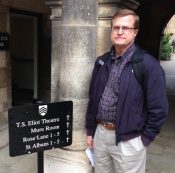By Glynn Young
A single comment by my father nearly six decades ago led to a story idea.
“Your great-grandfather was too young to enlist in the Civil War,” he said. “So, he signed up as a messenger boy when he looked old enough to get away with it. And then he had to walk home when the war was over.” My father must have heard that from his father; he was four when his grandfather died, with no memories of him at all.
A year ago, when I decided I wanted to know more, any family member who might have known something was long buried.
The records in the family Bible provided few clues. One of millions published by the American Bible Society in the 1870s, it included family records inserted between the Old and New Testaments. The earliest recorded date was 1803, the year of the Louisiana Purchase; it noted the birth of my great-great-grandfather. But almost all the entries, stretching from 1803 to the 1890s, were in the same hand, if different inks – my great-grandfather’s handwriting (my great-grandmother had died in the 1880s).
The records even contained a mystery of their own – the death of a man with a different last name in 1862.
The handwriting is very even and precise, but it becomes slightly more irregular with the later entries (aging, I suspect). It includes the births and deaths of my great-grandfather’s siblings (only one sister survived him), and the births of his own seven children.
The idea for my great-grandfather’s story lay dormant in my head while life went on. Courtesy of a cousin, I became the keeper of the original, framed photograph of my great-grandparents. I knew one additional thing, something of a family legend. He had walked home at war’s end only to discover that his family was gone, seeking refuge in Texas. He continued his journey, on foot, until he found them.
The project began to take on a life of its own. Here’s what I learned.
First, ancestry sites are helpful. Distant relatives, people I had no knowledge of, had been filling in pieces of the family story. Family Search led me to a database of Civil War enlistees. It took some work, but I found my great-grandfather and his unit. While that told me nothing of what the man did, I could track his unit through what was left of the war (he enlisted in 1863).
I discovered that “walking home from the war” meant walking from Virginia to southern Mississippi. The walk took months, across a landscape scarred by war.
Second, I looked more carefully at the records in the Bible. The mystery man died the same day in 1862 as one of my great-grandfather’s brothers. It was the Battle of Shiloh. And the mystery man was a brother-in-law.
Third, census records helped fill in more information. My father said he came from a line of shopkeepers, but he really came from a line of small farmers. I found the family in the census records going back to 1820, and they’re listed as farmers. They did not own slaves; the census recorded the names of slaves as well, and none was ever listed for the family.
Fourth, books can fill in contextual gaps. The family lived near one of the towns visited during Grierson’s Raid, the basis for the 1959 movie The Horse Soldiers and the subject of two history books, one rather loose with the facts and one (The Real Horse Soldiers by Timothy Smith) solidly factual. That raid may have been what prompted my great-grandfather, young as he was, to enlist.
I’ll never learn everything I want to know, but I’ve learned enough to shape a story.
 Glynn Young is a national award-winning speechwriter, communications practitioner, and novelist. He’s the author of four published novels, Dancing Priest, A Light Shining, Dancing King, and Dancing Prophet; and Dancing Prince; and the non-fiction book Poetry at Work. Visit Glynn on Facebook, Twitter, LinkedIn, Pinterest, his blog, the Dancing Priest book page, and his business website.
Glynn Young is a national award-winning speechwriter, communications practitioner, and novelist. He’s the author of four published novels, Dancing Priest, A Light Shining, Dancing King, and Dancing Prophet; and Dancing Prince; and the non-fiction book Poetry at Work. Visit Glynn on Facebook, Twitter, LinkedIn, Pinterest, his blog, the Dancing Priest book page, and his business website.

Comments 1
Can’t wait for the story to be published.